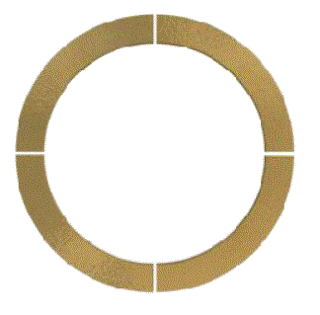Answer EKG Question 19
Q19.
Describe with the aid of sketches where necessary a vane type steering
gear showing how to weight of the rudder and stock are carried and the
arrangement that allow for wear down.
Answer: Rotary vane steering gear.
Operation arrangements:-
pipe
line is similar to 4-Ram hydraulic steering gear. The variable delivery
pumps deliver the oil into one side of the rotary vane and receive from
the other side, till the rudder is at required position. At this
position the feed back lever brings the pump to a zero pumping position
and the rudder gets hydraulically locked.
Advantages:- less space, lighter construction, less cost and low maintenance.
Rotary
vane steering gear can be fitted without a rudder carrier. The gear
applies a pure torque to the stock, eliminating any transverse loading
on the rudder bearings. They are compact, hence are useful with twin
rudder applications. It saves weight. Initial cost is less.
Disadvantages:-
Efficient seal is difficult to achieve especially at higher pressures
of 90 bar and above. It has a leakage path from high to low pressure
side at higher pressures. It is limited to ships requiring low rudder
torque.
Construction:-
Vane type gear may
be regarded as equivalent to a two-ram gear, with torque capacities
depending on size. An assembly of two rotary vane gears, one above the
other, provides the security of a four ram gear.
The rotor C is fitted and keyed to a tapered rudder stock, the stator B is secured to the ship's structure. Fixed vanes, secured equidistantly in the stator bore and rotating vanes secured equidistantly in the rotor, form two sets of pressure chambers in the annular space between the rotor and stator. They are interconnected by a manifold. Fluid supplied at pressure to one set of these chambers will rotate C clockwise and the rudder will turn to port, or to starboard if the alternate set is put under pressure.
Three fixed and three moving vanes are usual and permit a total rudder angle of 70°, i.e. 35° in each direction.
The fixed vanes also acts as rudder stopper and allow a maximum angle of 80°.
A
mechanical operated relief valve is located in the rotary vanes. when
the rudder is brought to hard over, the valve stem contacts the segment
and opens the valve, thus allowing free passage of oil and preventing a
rise of pressure.
Rotation of the stator is prevented by means of two anchored brackets and two anchor bolts. the anchor brackets are securely bolted to the ship.
Builders
stool and vertical clearance is arranged between the inside of the
stator flanges and the top and bottom of the anchor brackets to allow to
allow for vertical movement of the rudder stock.
The
clearance varies with each size of rotary vane unit but is
approximately 38mm total and it is essential that the rudder carrier
should be capable of restricting the vertical movement of the rudder
stock to less than this amount.
The
anchor pin are fitted with special bushes in halves, shaped externally
in order to preload the synthetic rudder stock absorbers, which is
fitted between them and to the under brackets. The maximum deflection os
the stock absorbers under full load is approximately 1mm.
The
fixed and rotating vanes may be of spheroidal graphite cast iron. They
are securely fixed to the cast steel rotor and stator by high tensile
steel dowel pins and cap screws. Keys are also fitted along the length
of the rotary vanes, for mechanical strength. Assembly of the gear would
not be possible if the fixed vanes were keyed; they rely on the dowels
to provide equivalent strength.
The vanes fixing is considered to be of sufficient strength to make them suitable to act as rudder stops. Steel sealing strips, backed by synthetic rubber, are fitted in grooves along the working faces of the fixed and rotary vanes, thus ensuring a high volumetric efficiency, of 96—98% even at the relief valve pressure of 100 bar or over. Rotation of B is prevented by means of two anchor brackets, and two anchor pins. The anchor brackets are securely bolted to the ship.
The vanes fixing is considered to be of sufficient strength to make them suitable to act as rudder stops. Steel sealing strips, backed by synthetic rubber, are fitted in grooves along the working faces of the fixed and rotary vanes, thus ensuring a high volumetric efficiency, of 96—98% even at the relief valve pressure of 100 bar or over. Rotation of B is prevented by means of two anchor brackets, and two anchor pins. The anchor brackets are securely bolted to the ship.
Thrust bearing made of bronze takes the weight of rudder and allow the rudder to move freely.





Comments
Post a Comment